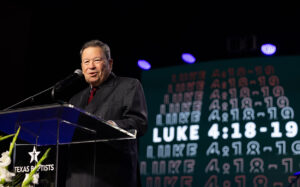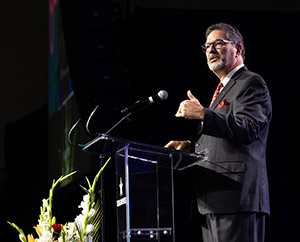Keynote addresses focus on Jesus’ kingdom agenda
WACO—Keynote speakers at Texas Baptists’ annual meeting expounded on various aspects of Jesus’ “kingdom agenda” as revealed in the Gospels.
“The kingdom of God was never designed to stop with us,” said Meghan Hendrickson, director of the Dallas Baptist University Baptist Student Ministry.
“I’m convinced that everything God pours into us, he desires to pour out through us. Jesus poured his life out for us. So surely, we should do the same.”
Hendrickson preached from Matthew 13:1-23 about the Parable of the Sower.
“On the day of our salvation, we were marked by good soil,” Hendrickson said, referencing the seeds that were cast on various types of soil in the parable.
“But my concern is that somewhere along the way, as we get older and busier, the soil of our souls has become shallow, rocky and surrounded by thorns as the worries and cares of this life are crowding out our greatest love and truest purpose.”
Invest time to make disciples
Hendrickson encouraged Texas Baptists to spend time with God, reminding them that without him, they cannot effectively disciple others.
She talked about a Hebrew class she struggled with in seminary. When she set apart some time with her teacher for individual instruction, she understood the concepts quickly and was able to excel.
Similarly, without concentrated time with the Lord, Christians are unable to produce meaningful discipleship, she said.
“Apart from him, we can do nothing, and yet sometimes we think we can produce something even though we’re disconnected from the vine,” she said.
Hendrickson talked about the difference individual and small-group discipleship is making among students involved in the BSM at DBU.
She also warned against being tempted to expedite discipleship by simply proclaiming a message broadly to the masses. Though culture lauds widespread, broad efforts to share information, it seldom brings about change.
“If we want to see the reign of Christ on college campuses and beyond, we have to be willing to go small to grow big. Some of Jesus’ more memorable moments are times with individuals that others did not have time for. A small seed grows into a big plant,” she said.
She described the amazing work already happening on campuses across the nation, where students are open and hungry to learn more, she said.
“God is at work among this generation of college students, and he’s going to do it whether we join him or not. But don’t we want to join a God like that?” Hendrickson asked.
“All of us have been assigned a field by God that he expects, invites and equips us to go out into and sow gospel seeds. Are we joining him in the harvest?”
Make the invisible kingdom observable
Joel Gregory, retired professor of preaching and evangelism at Baylor University’s Truett Theological Seminary, said the kingdom of God is a gift.

“We don’t build the kingdom. The kingdom builds us,” Gregory said.
Jesus is sovereign over the everlasting kingdom of God. While the reign of earthly kings eventually comes to an end, “The King of Kings has no expiration date,” he said.
The kingdom comes without observation, Gregory noted.
“It’s our job to make visible that invisible kingdom so that people are born from above and see the kingdom of God,” he said.
The kingdom of God possesses inherent power with a “principle of life in it.” It is a “remarkable power we can’t explain,” Gregory said.
God’s kingdom arrived when the King of Kings entered human history, but it awaits its consummation at the Second Coming of Christ, he noted.
“The kingdom of God is already but not yet,” he said.
Some preachers shy away from preaching on the Second Coming because of the excesses of some date-setters, but Gregory reminded Texas Baptists: “You don’t preach the whole gospel if you don’t preach that blessed hope.”
‘The clarity of the gospel’s agenda’
Al Curley, III, executive pastor of Cornerstone Church in Arlington, preached on “the clarity of the gospel’s agenda.”

The clear source of the gospel is the Spirit of God in his people, Curley said.
“Without the Spirit, we are at most successful in the eyes of man, but not in the eyes of God,” he said. “When the Spirit of the Lord is on you, the Spirit should be able to do some work in you and through you because the gospel has an agenda.”
Curley said the system of the gospel is clear: “to preach the good news to the poor and to proclaim release to the captives” (Luke 4:18).
“Beautiful feet are sticky feet—feet that seek to get in and get on and get around those they encounter with the gospel,” he said.
The strategy and the subject of the gospel similarly are clear, Curley noted. They are “to preach the good news to the poor, to proclaim release to the captives, recovery of sight to the blind, to set free the oppressed” (Luke 4:18).
“But the gospel imposes on all humanity the need for a chain-breaking Christ to provide grace to the oppressed, mercy to the oppressor, forgiveness for the sinner that they might have freedom in new life,” he said.
Finally, Curley pointed to the significance of the gospel, which is that “scripture has been fulfilled in your hearing” (Luke 4:21).
“The significance of the gospel is found in the sufficiency of Christ, that God has already done the work,” he said.
‘Peace, healing and justice’
Albert Reyes, president and CEO of Buckner International, said the kingdom Christians are offering the world is “a kingdom of wholeness” that “offers peace, healing and justice.”

Referencing John 14:27, Reyes said Jesus is the Prince of Peace who gives peace “not like the world gives.”
“The world gives you peace in the absence of conflict, in the absence of difficulty, in the absence of problems,” said Reyes. “[Jesus] gives you peace in the presence of conflict, in the presence of animosity and the presence of difficulty … That’s when the Prince of Peace steps up when it doesn’t make sense, and so he gives you the peace that passes all understanding.”
Reyes noted the healing Jesus offers often is a gradual, therapeutic type of healing.
He compared it to the response of the Good Samaritan to the man who was lying wounded by the roadside.
“It’s a Samaritan investment that says, ‘We’re going to help you now, and I’m coming back for whatever’s needed to get you to the point [where] you have wholeness and healing and restoration,’” he said.
The kingdom of God offers justice, Reyes said, noting “when the kingdom comes near, things change.”
“When we invade the space of people who need hope, we take the King and the kingdom with us. And when we see things that are wrong, we start to ask, ‘What would the King want done in this situation?’ And then we get to work,” Reyes said, describing the church as “the sign and the agent of the kingdom of God”
Compiled from reports by Bonnie Hirschfeld of Texas Baptists Communications, with additional reporting by Managing Editor Ken Camp.